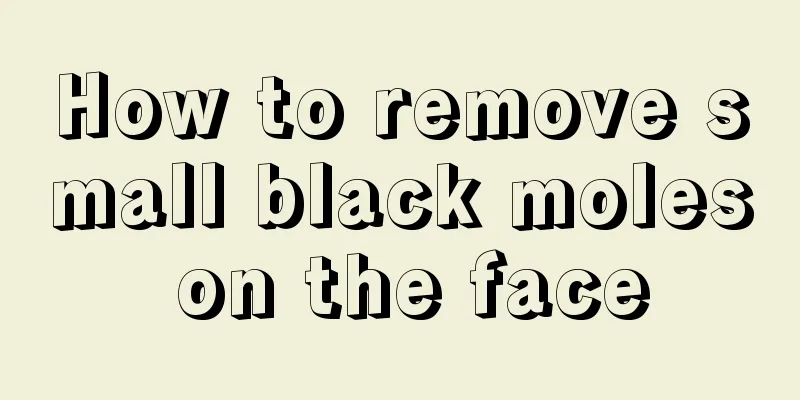How to remove small black moles on the face

|
We often see that some people have many dark moles on their faces, some are bigger and some are smaller, and most of them are found in men. This may be caused by the accumulation of a large amount of melanin, coupled with the lack of attention to skin care. Many people are particularly distressed about these black moles on their faces because they cannot be removed with ordinary skin care products. So, how to remove small black moles on the face? It is formed by the abnormal increase and accumulation of melanin granules secreted by melanocytes or melanocytes in the skin. For example, common black moles are formed by the accumulation of increased melanocytes in nests or clusters; while in nevus of Ota and freckles, the increased melanocytes are scattered and can appear in different colors due to the different depths of their distribution. There are many types of moles. The most common one is the localized black mole (which is divided into boundary nevus, intradermal nevus and compound nevus according to its depth). In addition, there are giant black moles (congenital melanocytic nevus with huge area), halo nevus (melanocytic nevus with surrounding ring-shaped skin hypopigmentation), simple freckles (moles), freckles (appear on exposed parts such as the face, are brown in color, and deepen after sun exposure), cafe au lait spots (light brown patches that appear at birth), chloasma (light brown patches that appear on the cheeks and forehead of healthy women), nevus of Ota (blue-brown nevus on the eye and maxilla), nevus of Ito (blue-brown nevus on the trunk and limbs), blue nevus (blue maculopapules or nodules), etc. 1. Chemical drugs There are strong acid or strong alkali chemical agents available on the market for cauterization, while hospitals use trichloroacetic acid to remove moles. It is more effective for newly appeared and relatively shallow combined moles. Excessive cauterization often causes sunken scars, or raised scars due to scar-prone constitution. 2. Electric burning It is effective for shallow combined nevi and deeper and raised compound nevi. The operation is difficult to control and can easily cause scars. 3. Freezing Freeze the mole with liquid nitrogen. It can effectively remove both protruding and flat moles. Since it is difficult to control the depth and it often causes damage, dermatology departments do not usually use it to treat moles. 4. Surgical Resection It can be removed once and for all. If there is a mole that may become malignant, pathological tissue examination can be performed after removal. Resection is a type of surgery, so it requires anesthesia and sutures, and the wound is more difficult to care for. 5. Laser vaporization of mole Except for some punctate bleeding that may occur after laser surgery, there will be no trace at all after rehabilitation. Only suitable for shallow moles, because the residual melanocytes under the skin will repeatedly emerge, requiring multiple laser treatments It is a bit difficult to preserve eyebrows There are many plastic surgery methods available now, each with its own advantages and disadvantages. You should first let your doctor examine the condition of the mole and make recommendations before making a decision. Electrocautery Method: Use the principle of electric high-temperature burning to remove the mole by burning and carbonization. Advantages: Easy to operate, and can be performed in some beauty salons. Disadvantages: It is difficult to control the degree of burning and it is easy to leave scars. Indications: Moles with a diameter of 0.3-0.5 cm. Laser mole removal Method: Currently, shallow moles can be removed with lasers, such as ruby laser, chrome laser or dye laser; if the moles are larger and deeper, carbon dioxide ultra-pulse laser should be used to remove them. Advantages: Laser mole removal can control the size and depth of the optimal light spot, and is less likely to leave scars or become infected. Disadvantages: For moles that are too deep, you may still need to treat them in multiple sessions. Indications: Most moles, including deep and shallow moles, can be treated. Surgical resection Method: Surgical removal of the diseased tissue around the mole. Advantages: This method can choose to partially or completely remove the diseased tissue, and different treatment methods can be used depending on the nature of the mole. Disadvantages: It is difficult and time-consuming, so this method is rarely used for common moles. Indications: Large, raised moles with a diameter greater than 0.6 cm. If the chemical corrosion method is used, some chemical solution is applied directly to the small black mole, and then the small black mole is completely corroded. After the scab forms, the small black mole will fall off completely. This method still has certain risks. If you accidentally get the chemical solution on healthy skin, it may cause burns and easily leave scars. |
<<: What are the consequences of lumbar muscle strain
>>: What causes erythema multiforme
Recommend
What are the ways to relieve cough with egg sesame oil?
After middle age, as people age, their blood vess...
Can the tendons in the stomach of sea cucumber be eaten?
Sea cucumbers are very precious ingredients in da...
Pay attention to the early symptoms of melanoma
The symptoms of melanoma are often ignored by car...
How long does it take for onychomycosis medicine to take effect
If you have onychomycosis, you must receive regul...
What is primary liver cancer? Check out the three major diagnostic methods for primary liver cancer
Life is spent with diseases big and small. Primar...
The secretion on my face smells bad
Secretion is one of the issues that people are mo...
What to do if bladder cancer metastasizes to the urethra
In addition to urinary system color Doppler ultra...
What are the dangers of dyeing hair
I believe many people have the experience of dyei...
Can winter melon and pork ribs soup be eaten overnight
Winter melon and pork ribs soup is actually a ver...
How to adjust the initial anti-aging diet?
Every female friend reaches the age of 25. The mo...
What are the symptoms of rheumatic fever and rheumatism
Rheumatism is a type of disease that many of our ...
How long does it take to soften hair
The softened hair will look very smooth and soft....
What to do about aging face
Our appearance will change with our age. If we ar...
How to prevent scalp pain accompanied by hair loss
In everyone's definition, hair loss only happ...
How many meridians are there on the legs
As people pay more attention to meridian care, fi...









